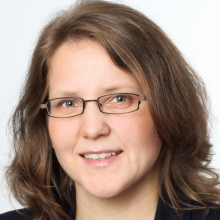
Projects from Prof. Dr. Christine Silberhorn
MIRAQLS: Mid-infrared Quantum Technology for Sensing
Duration: 10/2022 - 09/2025
Funded by: EU
TRR 142 - Cavity-enhanced spontaneous parametric down-conversion with temporal filtering using integrated superconducting detectors (C07*)
In this project, we will study the parametric down-conversion in a cavity with integrated superconducting detectors under cryogenic conditions. By using ultrafast driving electronics, we will implement pump filtering in the time domain, by enabling the integrated detector only after the pump has decayed away. The herald photon remains resonant with ...
Duration: 01/2022 - 12/2025
Funded by: DFG
TRR 142 - Hybrid lithium niobate on insulator quantum photonic integrated circuit (C08*)
In this project, we will explore thin-film lithium niobate on insulator (LNOI) as the material platform for quantum photonic integrated circuits. After transfer printing of cavity coupled InAs quantum dots onto a LNOI circuit, we will on-chip frequency convert the on-demand generated photons from the quantum dot using a periodically poled LNOI ...
Duration: 01/2022 - 12/2025
Funded by: DFG
TRR 142 - Compact high performance photon pair source using ultrafast hybrid modulators based on CMOS and LNOI (C11*)
The project aims to study and demonstrate miniaturized sources of decorrelated photon pairs with high repetition rate. The goal will be achieved by jointly integrating high-bandwidth electro-optic modulators, and a specifically tailored parametric down-conversion (PDC) section, both in a lithium-niobate-on-insulator (LNOI) platform. To obtain ...
Duration: 01/2022 - 12/2025
Funded by: DFG
Contact: Christian Kress, M.Sc.
PhoQuant: Photonic Quantum Computing - Quantum computing evaluation platform
When a sufficient number of quantum particles are interconnected, quantum computers can handle tasks that are unsolvable for classical computers. This – among other unique selling points – is a major advantage of photonic platforms: Integrated architectures and sophisticated manufacturing processes offer an enormous scaling potential. The aim of ...
Duration: 01/2022 - 12/2026
Funded by: BMBF
Contact: Prof. Dr. Christine Silberhorn, Dr. Benjamin Brecht
Quantum Photonic Technology Education – Professional training for platform-independent and photonic quantum computing
qp-tech.edu started in 2022. It is funded by the Federal Ministry of Education and Research (BMBF). Its goal is to develop a learning program for the industry to get familiar with quantum science. At the department of Computer Science of Paderborn University, we develop the related part to computer science. More information on the project is to be ...
Duration: 01/2022 - 12/2024
Funded by: BMBF
Photonic Quantum Systems Network (PhoQSNET) - Quantum communication infrastructure
Data security is critical to modern society. From personal data and identity fraud to cyber-attacks threatening the integrity of sovereign nations, the need for secure communication and data processing has never been greater. While quantum networks address some of these issues, in that they can be provably secure for many cryptographic ...
Duration: 01/2022 - 12/2027
Funded by: DFG
PhoQC: Photonic Quantum Computing
Photonic Quantum Computing (PhoQC): The aim is to research the fundamentals for the realization of photonic quantum computers. For this purpose, an internationally leading research center is to be created at the University of Paderborn in perspective, in which the fields of physics, mathematics, engineering sciences, computer science and electrical ...
Duration: 11/2021 - 12/2024
Funded by: MKW NRW, EIN Quantum NRW
Quantenbauelemente – integriert, optisch, skalierbar (Qinos)
Duration: 09/2021 - 08/2023
Funded by: BMBF
